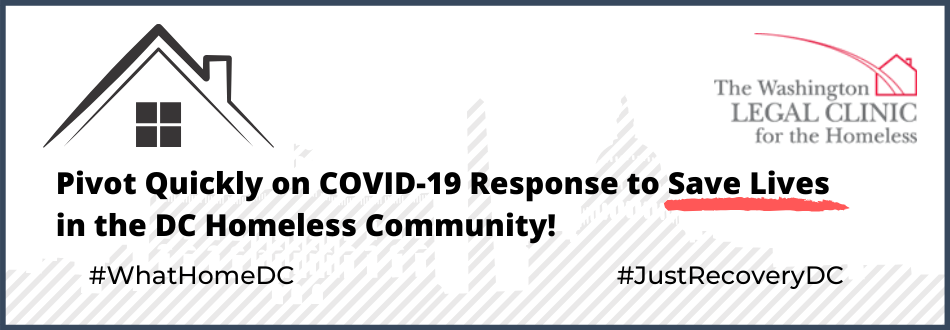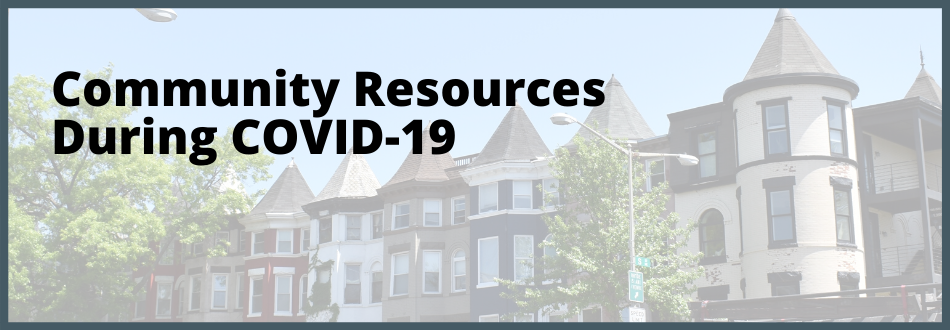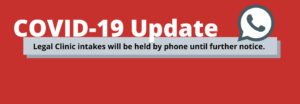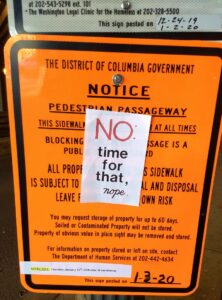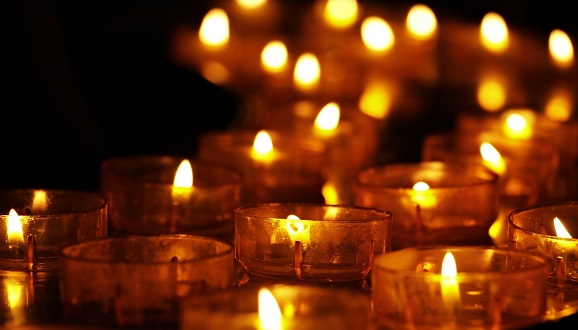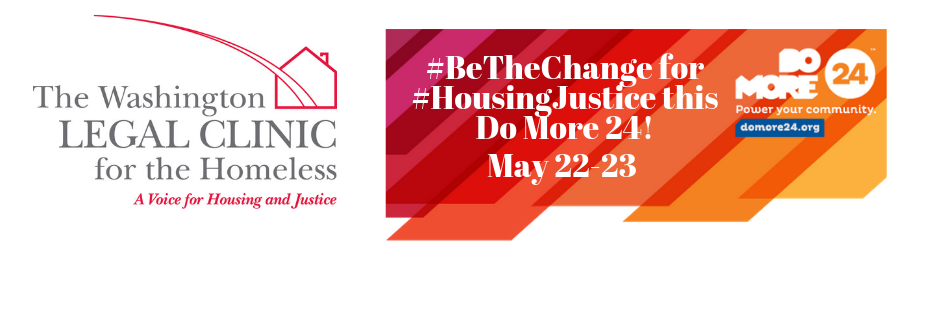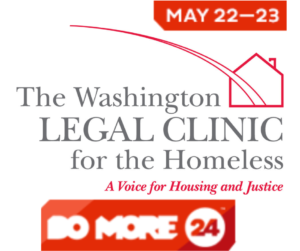May 1 update: we need your help. Please sign this petition asking the Mayor to do more to halt the spread of COVID-19 in the homeless community.
April 27 update: please see our letter to the Mayor and statement here on what DC needs to do today to protect the health and well-being of the DC homeless community.
This post was originally published on April 2. It has since been updated to reflect what was passed by DC Council upon its April 7 vote on supplemental emergency legislation on COVID-19 public health emergency, as well as additional information.
While we at the Legal Clinic have always asserted that housing is health care, the current public health emergency makes our work to ensure that everyone has safe, healthy housing even more urgent. Stable housing is necessary both to keep individuals healthy and to keep our entire community healthy and functioning. A report recently concluded that “homeless individuals infected by COVID-19 would be twice as likely to be hospitalized, two to four times as likely to require critical care, and two to three times as likely to die than the general population.”
Every day we learn new things about the virus and the efforts being made by the community and the DC government to keep people safe. Organizers, communities, and neighbors have rapidly set up mutual aid networks to best serve the immediate needs of community members throughout DC. DC agencies, non-profits, and service providers have made drastic adjustments to their service models in order to continue providing vital support, as circumstances shift daily. We continue to monitor, provide input, compile resources, and advocate for what our clients tell us they need to be safe. We thought it was important to share what we know, with the understanding that we will need to regularly update this post to reflect changes.
Here is a listing of the covered topics:
- Homelessness
- Street homelessness and encampments
- Emergency shelters (families and singles)
- Rapid Re-Housing
- Housing
- DC Housing Authority (DCHA)
- Housing Choice Voucher Program
- Public Housing
- Evictions and Utilities
- Emergency Legislation
Homelessness
Street Homelessness and Encampments
The Deputy Mayor for Health and Human Services (DMHHS) has called off encampment clearings, other than trash pick-up – a decision that predates and is consistent with the new CDC guidance. Outreach workers at organizations like Pathways to Housing, Miriam’s Kitchen, Community Connections continue to bring supplies to people on the street, including hand sanitizer when they can get it. Most dining and day programs have closed, but some providers and churches are providing meals for pick-up to the community and outreach workers are notifying people in encampments about where to pick up food. Mutual aid workers have also been bringing supplies to people living on the street, and checking in on their needs. People who work as well as those who rely on panhandling to meet basic needs have likely lost most or all of their income.
The CDC guidance on unsheltered homeless persons, in addition to recommending that encampment clearings stop, recommends 24 hour access to portable bathrooms and handwashing stations for any encampment with more than 10 people present.
- We do not know how many or whether DC has obtained bathrooms for encampments yet. We recommend that they explore using portable bathrooms or providing access to certain public restrooms in order to comply with this provision of the guidance.
Update 4/16/20: There are now 9 portable bathrooms around the city.
- While DC has obtained 17 handwashing stations, we are reviewing their locations now to see if there are enough for all the food stations and all the encampments of more than 10 persons. We may need more at larger encampments, like the ones in NoMa.
Update 4/16/20: There are now 32 handwashing stations around the city.
- We are checking on whether federal authorities, like the U.S. Park Service, are following the CDC guidance, or are continuing to clear encampments in federal parks in DC.
Emergency Shelters
If you have questions about DHS services and programs during this time, you can send an email to dhs.covid19@dc.gov.
The DC Department of Human Services (DHS) has modified some of its operations. DHS has informally committed to stopping shelter terminations during the public health emergency, other than for the threat or act of violence. We support this decision and recommend that it be formalized and shared more broadly in the community, and that the policy be in effect for the entire duration of the public health emergency. We have recently learned, though, that DHS may be moving forward with mandatory transfers (where the family does not want to move) from family shelter to a prevention program for families who have been absent from shelter for a certain period of time. We will update this blog when we have more information, but our position is that mandatory transfers out of shelter are terminations, and should be covered under the moratorium. (Any issue with unused rooms can probably be easily explained with some communication with the family about the reason for the absence, and in most cases the family is likely to either return or voluntarily vacate.)
Update 4/16/20: We sent this Letter to DHS about family shelter transfers 4-7-20 to DHS with our concerns about mandatory transfers, along with Bread for the City, Children’s Law Center, Legal Aid Society, DC KinCare Alliance, DC Fiscal Policy Institute and Fair Budget Coalition. Since then we have had a call with DHS personnel and continue to be engaged in conversations about how best to maximize the use of shelter space while complying with the law and ensuring the safety of individual families. We will provide another update soon.
Family Shelters
- The centralized intake center for homeless families, Virginia Williams Family Resource Center (Virginia Williams), is closed to the public. Instead, families needing shelter must call the Shelter Hotline at (202) 399-7093. They will then be routed to an on-call intake worker to do an eligibility assessment.
- In the emergency legislation passed on March 17, DHS sought and obtained authority to extend the agency’s time to find families ineligible for shelter after placement via an Interim Eligibility process. The agency’s stated intent was to allow them to place families immediately during the crisis, without doing extensive verification of documents for eligibility.
- There are some kinks in the new system, which we are trying to work out. We have had calls from multiple families denied shelter during the public health emergency. (Remember that we can no longer do outreach at Virginia Williams, so we are probably hearing from a small fraction of families we would normally interact with.):
- We are hearing that hotline workers are still saying “we don’t place families” despite DHS providing specific guidance that they should not say that.
- We have had clients with technical issues with the calls, including dropped calls, no return phone calls, or no answer from the daytime number provided by hotline staff.
- While some reduction in paperwork requirements may be occurring, we are hearing that families are being turned away when they only have their word to verify eligibility– when they are unable to provide documentation to resolve a factual dispute or challenge a finding of ineligibility. We have asked DHS to allow families to self-certify eligibility factors and be placed in Interim Eligibility instead of turning families away. As of this posting, DHS has not agreed to this, even though they are doing so in the other public benefit programs that they run. (For example, families are allowed to self-certify income to receive food or cash benefits, but families are not allowed to self-certify their homelessness or residency in order to be placed in emergency shelter. Same agency, even likely the same families, but a different policy.) This policy is particularly troubling considering how difficult it will be for families to fight these cases when they can’t access proof. They will either have to put themselves and others at risk by breaking social distancing or they will need documents from businesses and government offices that are closed. Our recommendation is that DHS be required to place and maintain all applicants who self-certify eligibility in Interim Eligibility during the public health emergency.
- Once in shelter, DHS is working to ensure that families have adequate access to food and the internet. Groups like Homeless Children’s Playtime Project have shifted their models to continue providing critical support to families through play kits and donations.
- For families in one of the new Short Term Family Housing shelters who are symptomatic or waiting for a test result, DHS will be placing them in a different shelter or a quarantine facility if they are in one of the new shelter units with a shared bathroom. (Approximately 80-90% of the new Short Term Family Housing rooms have a shared bathroom.)
Shelters for Individuals
- All shelters are now open 24 hours a day. Residents are being encouraged to stay in the same shelter every day, and sleep in the same bed.
- All shelters have instituted regular deep cleaning and should have hand sanitizer available.
- Shelters are attempting to practice social distancing. DHS has stated that residents are being asked to sleep head to foot, and beds are being placed three feet apart. Food is being provided at the shelters as “grab and go.”
- All residents at congregate shelters are being screened at entry for symptoms of COVID-19. If someone presents at the shelter with symptoms, or with a letter from a healthcare provider stating that they need to quarantine, they are being relocated to a facility that meets their testing, healthcare and isolation needs.
It is, and will continue to be, incredibly challenging to control the transmission of COVID-19 in large congregate shelters. It is a daunting task. The DC government has two critical goals: 1) slowing the transmission and 2) preventing high risk individuals from contracting COVID-19. In order to accomplish these goals, there has to be enough space available to properly distance people from each other. Congregate shelters have hundreds of people in a relatively small space, often in dorm- or barracks-style sleeping quarters. In two days, the number of reported cases in shelter jumped from 5 to 12. It is inevitable that more shelter residents will contract the virus, and it will spread very quickly.
Update 4/16/20: 77 people experiencing homelessness now have tested positive, and 4 individuals have passed away after contracting COVID-19. Daily numbers can be found here.
The protocol right now is that a person who has tested positive for COVID-19 is moved to quarantine or a hospital, if necessary, and that anyone who has had “direct exposure” to that individual will be tested and quarantined. We are unsure how “direct exposure” is being defined or implemented in the context of a congregate living space, as it could mean, for example, people using the communal restroom or shower at the same time or shortly after, or people who sat with them at a dining table prior to distancing rules being put in place. It is difficult to determine all of the interactions that may have occurred in settings where hundreds of people reside in the same location.
Update 4/16/20: A Mayoral Order issued yesterday clarified that anyone who shared any floor, room, restroom facilities or other space with an individual who has tested positive in a congregate facility will be screened for COVID-19, including being prioritized for testing. When individuals are tested, they are supposed to be placed in quarantine while they await results. We will be checking in with DHS to see if they have capacity in quarantine to place all the individuals affected by this new protocol, because we would expect numbers to significantly increase. For example, if there is a positive case in a shelter like New York Ave, all 360 men who stay on the first floor should be tested and moved to quarantine.
Accordingly, it is vital that as many people as possible who live in congregate settings – prioritizing people who are categorized as high risk – be immediately offered placements in safe, non-congregate vacant housing units, dorm rooms, or hotel rooms. We understand from DHS that they have already begun screening medically vulnerable residents and moving them into hotels. We also recommend that all individuals in congregate shelters be tested for COVID-19 and be provided space to isolate upon awaiting the results. We are already seeing other jurisdictions, like New Orleans and Connecticut, take some of these steps, and we must do so in DC before it is too late.
Update 4/16/20: While DC has begun to place medically vulnerable people out of congregate shelters and into hotels, the numbers of people in shelter are still very, very high and the numbers of homeless people contracting COVID-19 are growing rapidly. Just yesterday, in San Francisco, the Mayor was ordered by legislators to secure 7000 hotel rooms for people experiencing homelessness after an outbreak in a shelter: “Several members of the Board of Supervisors said the city had failed to heed warnings that ‘congregate’ shelters such as MSC-South were fertile ground for the spread of the virus. ‘I am sorry,’ said Supervisor Dean Preston, addressing shelter residents directly, ‘that after weeks of warnings, only the confirmed outbreak in your shelters spurred action from all of us.’”
Rapid Re-housing
We have numerous clients who were in the process of being exited from rapid re-housing due to reaching the time limit when the public health emergency hit. We know many more will come to the end of their time during the emergency, and many more will reach that time limit shortly thereafter, despite many of them facing serious setbacks to their employment and education goals as a result of the crisis. We had asked DHS to provide a blanket four month extension to everyone in rapid re-housing.
We just learned that DHS has withdrawn all notices of exits that were issued in the month of March, is pausing on exiting anyone who was in the process of being exited prior to the crisis hitting, and will not issue terminations in April. We have reached out for some clarity on whether the new policy is to stop exits for the duration of the crisis or just for one month at a time.
We recommend a moratorium on rapid re-housing terminations for the duration of the public health emergency. We are also asking for the development of a policy that provides a blanket extension for all families in the program, recognizing how economic setbacks will significantly impact all families in achieving their goals.
Housing
DC Housing Authority (DCHA)
- The Agency is operating on remote status until April 27, 2020 (subject to change, pending DC government public health instructions).
- The building lobby is still open to the public in order to provide access to the dropbox, if residents still desire to directly drop off documents.
- Interim re-certifications and rent recalculations are still being processed, though residents will not be penalized for failure to submit during this period of time (while agency is on remote status- through 4/24/20).
- Reasonable accommodations will continue to be made, if vital to health and safety.
- No recommendations for termination will be made during this period of time.
- The Office of Fair Hearings has currently suspended all hearings through April 27, 2020, and will extend beyond that date, if need be.
- Requests for Fair Hearings are still being processed.
- Residents can still contact DCHA through its main number (202-535-1000), and calls will be routed to the appropriate departments/staff. Residents can expect calls to be returned.
- DCHA’s COVID-19 Response Page: DCHA Updates and Resources for COVID-19 RESPONSE – DCHA
- For general inquiries: covid19@dchousing.org
Housing Choice Voucher Program
- Vouchers will be extended, and this period of the DC public health emergency (currently until 4/27/20) will not be counted.
- Initial inspections of vacant/unoccupied units and emergency inspections are still happening, so lease-ups are still occurring, where possible.
- Concerns regarding interim re-calculation of rent (loss of income)/rent review: hcvpcovid19interim@dchousing.org
Public Housing
- Over 25,000 pieces of mail have been sent out to alert residents to the public health emergency and CDC’s recommendations. Posters and signs have been placed around buildings and common areas. Information directed to senior buildings has been directly delivered to each unit.
- Common areas have been closed for public health reasons, except for those that contain vending machines. Deep cleaning of open common areas has been occurring 3-4x each day.
- Senior buildings-Weekend cleaning is also occurring and meal delivery is continuing.
- Emergency work orders are being completed. Non-emergency work orders are being logged during this period.
- Concerns regarding interim re-calculation of rent (loss of income)/rent review: phcovid19interim@dchousing.org
As things are constantly changing, DCHA has committed to continue to update residents and advocates on its operational policies and procedures. Specifically, we are awaiting an update on whether all Fair Hearings will be suspended past the initial date of April 6th and extended to the date that DCHA resumes regular operational status (currently April 27, 2020). DCHA has indicated that an extension will most likely occur, as it recognizes the limitations of attempting to conduct proceedings via telephone or internet. However, the agency is still exploring the logistics. DCHA has expressed that its intention is not to unfairly impact or penalize any of its residents during this public health emergency. We certainly intend to hold the agency to that commitment.
**Update: DCHA’s Office of Fair Hearings has extended the April 6th date and will continue to suspend hearings through April 27th , and beyond, if need be.
Evictions and Utilities
The DC Council passed emergency legislation on Tuesday, March 17, 2020, that, among other things prohibited evictions, late fees or utility shut-offs during the public health emergency. DC Superior Court has issued an order postponing all evictions and non-urgent cases until, at least, May 15th. Landlords will also be required to give a new 21 day notice.
While these are critical steps, there is more to be done to ensure that DC residents don’t lose their housing or utilities as soon as the public health emergency is lifted. We recommend that the DC Council institute a freeze on rent increases, postpone eviction filings, and significantly increase funds for the Emergency Rental Assistance Program. We will also need to figure out additional ways to support tenants and prevent homelessness in the coming months, including a potential increase to utility assistance and/or other forms of relief.
Updates from the April 7 Supplemental Emergency Legislation:
- Expands utility shut-off benefits by including cable and telecommunications prohibitions (providers must continue access to basic level services) during the public health emergency and 15 days thereafter
- Includes a provision for no rent increases during the public health emergency and 30 days thereafter.
- Tolls tenant/tenant association deadlines for the duration of the public health emergency and 30 days thereafter
- Tolls any notice to vacate that a tenant provided prior to the public health emergency so that the tenant has the same amount of time remaining as when the public health emergency went into effect
- Requires mortgage servicers to create a mortgage deferment program granting 90 days deferment period (at minimum), waiving any fees accrued during the public health emergency, and not reporting any negative info to credit bureaus.
- Any borrower granted a deferral has to reduce rent for the tenant in a proportional way to the reduction of the borrower’s deferment during the deferment period (but, tenant may be required to repay the amount of rent that was reduced within 18 months or the end of the lease—whichever comes first)
- Expands the section that tolls the time to request an appeal of administrative hearings for public benefits so that it includes tolling the time to appeal adverse decisions within homeless services
[See the April 7 Supplemental Emergency Legislation Final Draft and Amendment Sheet]
Emergency Legislation and Our Recommendations
The DC Council will be considering a second round of emergency legislation next Tuesday, April 7, on the public health emergency. We, along with many partners and allies, sent this letter this morning advocating for key protections for low-income DC residents.
The Legal Clinic’s primary focus is on advocating for the following changes or additions to the legislation:
- **Ensure that homeless services are included in the section that tolls the time to appeal for public benefits cases. (It would be ironic if the only benefits not protected during a city-wide “shelter in place” order were… shelter.) We have shared suggested language with the Council.
- Ensure that all high risk residents experiencing homelessness have access to safe housing, hotel rooms, or other private settings to reduce their risk of contracting COVID-1
- Require that DC follow CDC guidance to ensure the health and safety of residents of homeless encampments.
- Mandate that emergency shelter applicants can self-certify eligibility factors until the public health emergency has passed.
- Require a moratorium on terminations in rapid re-housing and emergency shelters throughout the emergency. This moratorium should include any adverse action, other than emergency actions, that results in the loss of shelter or housing, including: 1) program exits; 2) finding of ineligibility after a person has already been placed; and 3) mandatory “transfers” that result in a loss of housing or shelter.
- ** Prohibit any rent increases during the public health emergency.
- Prohibit eviction filings during the public health emergency.
- Expand and increase funding for the Emergency Rental Assistance Program (ERAP) to protect residents from homelessness and further displacement after the public health emergency ends.
**= recommendations that were included in the April 7 Supplemental Emergency Legislation
Advocacy and You
While the newest legislation establishes some necessary provisions, the Council has acknowledged that it still doesn’t do enough to address the needs of all DC residents during this public health emergency. We expect that a third round of legislation will be introduced at some point.
If you want to add your voice to this advocacy, you might…
- Send a message to Mayor Bowser (mayor@dc.gov), your Councilmember and to Chairman Mendelson (pmendelson@dccouncil.us) supporting these requests.
- Check out the demands of the DC Tenants Union and sign this petition.
- Support relief for undocumented workers here.
- Fill out and share this survey created by Mutual Aid organizers, aiming to ensure that the demands of impacted DC residents are uplifted and addressed.
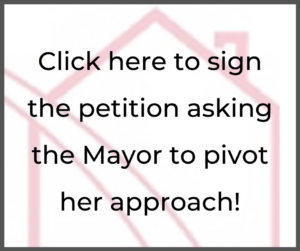 that widespread poverty has created. Since our inception, we have worked to affirm housing as a fundamental right—not a privilege. Perhaps no moment more critically highlights the crucial importance of and need for housing and safe spaces than the current public health emergency. COVID-19 has ravaged the most vulnerable communities across this nation. It has directed a spotlight onto the many injustices and inequities faced by those existing in spaces that society has cast aside, exacerbating the real and deadly effects of poverty and white supremacy. It has pushed to the forefront conversations around health and economic disparities, income inequality, housing insecurity, and the inequitable allocation of resources.
that widespread poverty has created. Since our inception, we have worked to affirm housing as a fundamental right—not a privilege. Perhaps no moment more critically highlights the crucial importance of and need for housing and safe spaces than the current public health emergency. COVID-19 has ravaged the most vulnerable communities across this nation. It has directed a spotlight onto the many injustices and inequities faced by those existing in spaces that society has cast aside, exacerbating the real and deadly effects of poverty and white supremacy. It has pushed to the forefront conversations around health and economic disparities, income inequality, housing insecurity, and the inequitable allocation of resources.